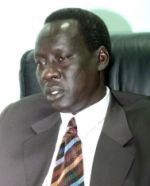SPLM minister says NCP delaying Sudan peace deal
July 5, 2006 (KHARTOUM) — A leading southern Sudanese politician accused the ruling party on Wednesday of dragging its feet on implementing last year’s north-south peace deal to delay being forced to share oil revenues.
 Cabinet Affairs Minister Deng Alor, a member of the former southern rebel Sudan People’s Liberation Movement (SPLM) said the ruling National Congress Party (NCP) had hindered work on the formation of commissions meant to implement the deal.
Cabinet Affairs Minister Deng Alor, a member of the former southern rebel Sudan People’s Liberation Movement (SPLM) said the ruling National Congress Party (NCP) had hindered work on the formation of commissions meant to implement the deal.
“Implementation is very slow. On other issues the implementation is not taking place at all. Because of the oil,” Alor told Reuters.
The SPLM and Sudan’s Khartoum-based rulers formed a coalition government after a signing a peace deal last January to end more than two decades of north-south civil war. The deal also ushered in a south Sudan regional government.
One of the deal’s key tasks is to demarcate a north-south border which would establish control of oil fields. Under the agreement, oil revenues from the south would be split roughly equally between the northern and southern governments.
The south would receive no money from fields in the north.
Alor said that after an initial acrimonious meeting, the NCP had refused further talks with the petroleum commission, whose mandate includes examining oil contracts and oil output. The NCP currently receives all oil revenues.
“The NCP would like the status quo to continue so that we do not know much about things associated with oil production,” Alor said, adding that without accurate production figures it would be impossible to divide oil wealth fairly.
“Our question now is 50 percent of what? This is what the National Congress does not want us to find out,” he added.
BORDER DEMARCATION
The Sudanese Oil Ministry was not immediately available for comment.
Analysts have said another obstacle to the petroleum commission’s work is the lack of SPLM representatives with in-depth oil industry knowledge.
Alor also said the border commission was inoperative because the NCP had denied it funding. As well as determining oil field control, the commission would decide the residency — north or south — of millions of Sudanese.
The distinction is important for parliamentary elections due by 2009, a referendum on southern secession in 2011, and a smaller referendum to decide the sovereignty of Abyei, an oil-rich area disputed by the north and south.
The SPLM has accused the NCP of unilaterally determining the border to include oil-rich areas in the north.
“The commission has been formed, but it hasn’t started its work yet. There’s been no progress…There’s no budget for them to start their work. They need money from the presidency to start their work,” Alor said.
The presidency was not immediately available for comment.
Alor also accused the NCP-controlled Sudanese army of continuing to support militias hostile to the SPLM.
Under the January 2005 deal, northern-backed militias in south Sudan were given the option of joining either the north or southern armies. But some have continued to attack SPLM forces.
“The Sudan Armed forces tell us they have ceased supporting them, but this is not true …. When we confront them with evidence they just keep quiet,” he continued.
The NCP denies it still supports southern militias.
Despite the setbacks, Alor said the SPLM was keen to avoid a stalemate with the NCP.
“If one party is completely disabled politically, then what is the alternative? Stalemate, stagnation of the peace process. That’s why we are keen to see the National Congress listen.”
(Reuters)
